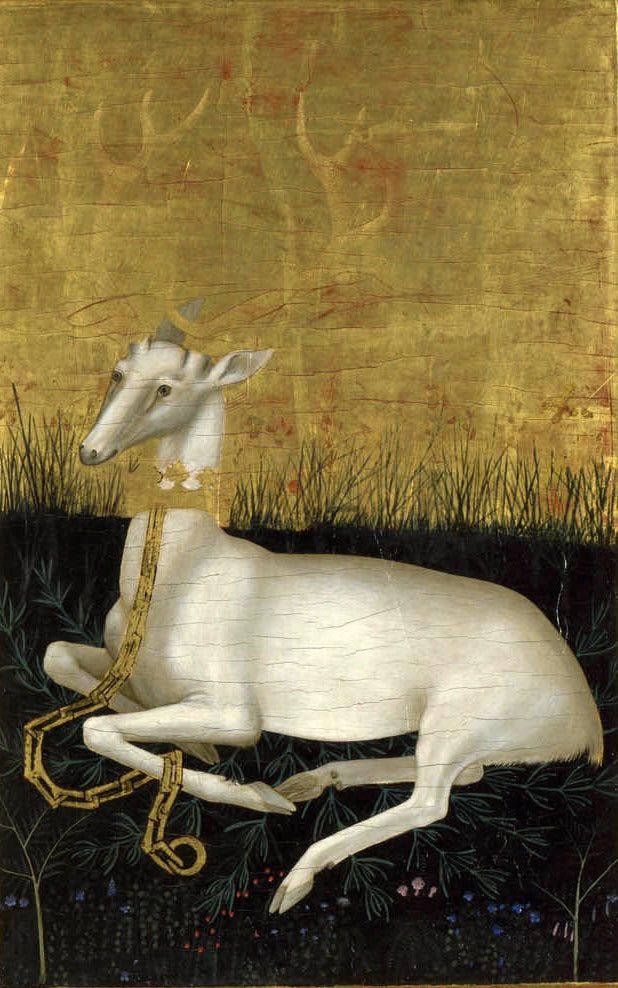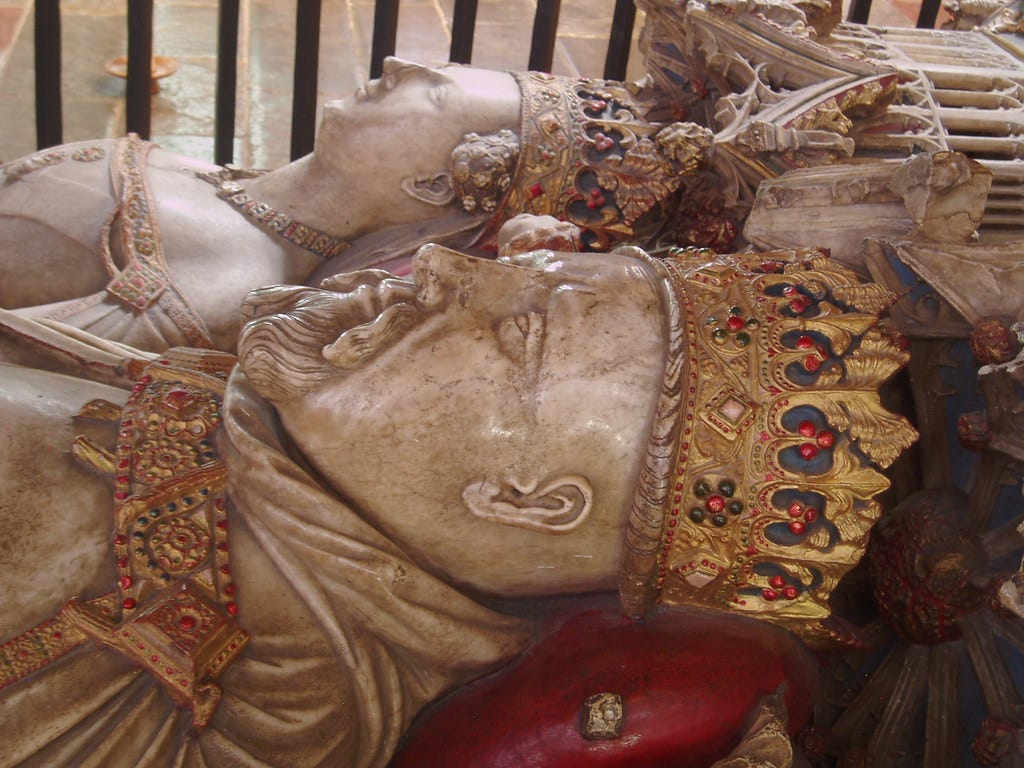Book Review: The Eagle and the Hart by Helen Castor
A vivid and absorbing exploration of medieval power that resonates uncomfortably in the present day.
Helen Castor is the GOAT.
No, that’s not an insult, but rather an acronym that means Greatest of All Time. Coined by Muhammad Ali, adopted by LL Cool J, popularised by Gen Z, the term now honours those who achieve, well, greatness, in their chosen fields. The term is, of course, subjective, but like a defiant King’s Champion during a 15th Century coronation banquet, I am more than prepared to throw down the gauntlets if anyone dares question me that the GOAT of our game is Castor.
Ever since I first picked up a Castor-penned book (‘She Wolves: The Women Who Ruled England Before Elizabeth, quickly followed up by devouring ‘Blood and Roses’ and then ‘Joan of Arc’), I’ve never wavered from this stance. This is before we consider her hugely popular TV work or the vast influence she has exerted through the academic field across the last few decades. Quite frankly, nobody tells an accurate history story like she, and it is for good reason Helen Castor is your favourite historian’s favourite historian.
It will be no surprise to learn, therefore, that this review of Castor’s much-awaited latest offering, ‘The Eagle and the Hart: The Tragedy of Richard II and Henry IV’, is going to be favourable. In short, it’s an unqualified success, a vivid and absorbing exploration of medieval power that resonates uncomfortably in the present day.
The premise of the book, a dual chronological biography that seeks to investigate the mindsets that nearly drove medieval England to constitutional collapse, is surprisingly novel, save for the series of Shakespeare’s fictional plays that still drive much of today’s knowledge of the protagonists.
Richard of Bordeaux, the hart from the book’s title, and Henry of Bolingbroke, the titular eagle, were both born in 1367. They were first cousins who shared a grandfather in the celebrated Edward III, England’s greatest monarch who was in the final act of his storied reign. As the century raced to the close, these two boys, the king’s eldest grandsons, represented the future hope of the Plantagenet dynasty.
At its core, this work is a study of how those two children, just three months apart in age, would travel diverging paths, not just physically but psychologically – how they collectively inherited an extraordinary royal legacy but understood the responsibility of that bequest in much different ways. One got it, but the other didn’t. The problem for England and her people was that on 16 July 1377, the 10-year-old boy who got it was crowned king in Westminster Abbey and the child that got it was stood nearby dutifully bearing the sword of state.
Richard II proved a disaster of a king. The boy who was crowned aged ten grew into a narcissistic, spiteful sovereign prone to bouts of petulance that proved dangerous, even deadly, for his subjects. As Castor deftly draws from her psychological and historical analysis of the surviving sources, Richard fundamentally misunderstood the basic principles of what was expected from him as sovereign.
A king was supposed to enforce law and justice, to protect the rights, lands and inheritances of his subjects, to ward off threats internal and external, and to provide structure and order that enables everyone to live in a prosperous peace. This is why the king is empowered above his peers at his coronation, to pursue and enforce this ideal. It was a demanding role that required the king to operate at his very best, to show both strength and restraint, to distribute patronage fairly and to accept counsel when appropriate, all of which would allow for the smooth administration of his realm. The finest of kings understood the strength in devolving a degree of power upon his nobility, but Richard was not one of those kings.
This, Castor suggests credibly, was the consequence of a boy becoming king too young, but old enough to be cognisant of events around him. Under normal circumstances, it may have been expected that Richard’s uncle (and Henry’s father) John of Gaunt would fulfil the role of protector until his nephew came of age, but Gaunt was deeply unpopular. The solution was for the Council to take control of governance, but perform as though it was the child king himself wielding the levers of power. An act of political smoke and mirrors, everyone was in on the scheme. Everyone, that is, except the boy king.
From his earliest memory, Richard was lauded by the men around him as a messiah-like figure, the subject of fawning reverence wherever he went. At one point, he was even very publicly identified with the Son of God, praise he took at face value. Such ceremonial worship would have intoxicated the most resilient of adult minds, perhaps evident today in celebrity culture, but to a child who was led to believe he wielded full power over his kingdom, this had an intense effect that stirred the beginnings of what would develop into extreme megalomania.
This may explain why Richard, ‘confident in his majesty’ as Castor elegantly puts it, so boldly faced down the rebels during the Peasants’ Revolt aged just fourteen. Inebriated by the reaction of the masses to his presence, Richard grew more conscious than ever of the ‘potential of his power’, and began to chafe of ‘the ways in which that potential was still constrained’ by the adults around him. Everyone said he was king, yet it seemed to him his authority was limited and decisions taken without his input.
Growing into a belligerent and erratic man, Richard was less concerned with more weighty matters of state but rather preoccupied with the royal prerogative and intent on suppressing those he viewed stifled his authority. Famously, when in 1386 parliament requested the removal of Richard’s ally Michael de la Pole as chancellor, the king snapped that he would not so much as remove a scullion from his kitchen at their request.
To Richard, everything revolved around his divinely ordained rights rather than the responsibilities that came with those rights. He did not view his nobles or the commons as worthy partners in governance, but rather ‘the greatest adversaries of his crown’ who sought to handcuff him.
Disdainful of political veterans and elder relations who sought to guide the king, Richard increasingly turned to a small cabal of favourites who had no compunction in placating his neuroses, to feed his sense of importance without any restraint. These were the ultimate yes-men, hangers on drawn from the lower reaches of the nobility who in response for their lack of backbone soon dripped with glittering titles and offices. This naturally provoked huge unrest among the higher echelons of Richard’s magnate class and a frustrated parliament that only served to deepen the rift between them and their king.
Galvanised by his favourites, Richard sunk irredeemably into the depths of despotism by the late 1390s, surrounded by a bow-wielding private army that terrorised his subjects. Landed estates were seized without justification, magnates were banished from the realm, and in the case of at least one political opponent, the king’s own uncle Thomas of Woodstock, dissenters were murdered. As Richard once chillingly wrote, his people needed to learn what it was to affront him, ‘for he is a child of death, who offends the king’. The king’s volatile nature meant few understood how not to offend Richard. An autocratic tyrant who had systematically removed the ‘norms, precedents and safeguards of political life’, unjustly ‘improvising from moment to moment’, it was clear by 1399 the situation was untenable and could not be permitted to continue. The question that lingered in the air was, if Richard was removed, with whom should he be replaced?
Henry of Bolingbroke, in Castor’s astute judgment, ‘embodied every quality Richard lacked’. He was an impressive figure, well-travelled, militarily competent, possessed a sharp and learned mind with a charismatic nature that proved popular with those he encountered, at home and abroad. He had ‘wealth, power, honour and renown’, everything except right to the crown that belonged to the cousin that despised him.
As one of the great magnates of the realm, Henry was dismayed by Richard’s unprecedented excesses, upset to see the institutions he deeply respected besmirched by his cousin’s ego. For his opposition, Henry was placed on trial, then banished abroad, and finally denied his inheritance upon his father’s death. Pressed into a corner with no hope of making good, Henry elected to pursue the unthinkable.
Suffice to say, without going into the details, covered in forensic detail in the book, Henry succeeded in turfing his cousin off the throne and seizing the crown for himself. In doing so, he chided his cousin, saying’ “it is commonly said among your people that…you have governed them very badly, and far too harshly”.
During Henry’s first parliament, as King Henry IV, the chancellor Archbishop Arundel made a pointed condemnation of the previous reign, preaching a sermon based on a verse from the Book of Samuel which said ‘A man shall rule over the people’. In Arundel’s speech, he noted ‘when a boy reigns, wilfulness reigns, and reason is exiled…from this danger we are now liberated, because a man is ruling’ – the message couldn’t have been clearer; despite both Richard and Henry being the same age, thirty-three, they were poles apart in how they conducted themselves.
By upending the accepted order and removing an anointed king, however, Henry was weighed down the damage he had inflicted on the traditions he deeply respected and sought to protect. Castor illuminates a particularly poignant scene where Henry weeps at the tomb of his father, and as she reveals in her rigorous examination of his will, the usurper regarded himself a ‘sinful wretch’ who possessed a ‘sinful soul’. He begged God for forgiveness for a life misspent and hoped that he had never offended his lords or subjects. There is little doubt Henry was forced to depose and kill his irascible cousin to salvage the kingdom, for in performing this public service, Henry would never find private peace. As Castor says, ‘the events of 1399 would always lay at the heart of Henry’s legacy’.
Political history is challenging when presenting to a public readership, but in ‘The Eagle and the Hart’, Castor fluently conveys all these deeply complex themes in the most accessible of manners. As is her customary style, she accomplishes this without squandering or compromising on any of the historical intricacies. This ability is built upon the back of decades of scholarly research in which the author has spent thousands of hours digging down into the archives, many more hundreds of hours educating new generations of historians in the highest institutions in the land, and perfected through the success of previous mainstream publications. It may seem effortless, but there behind the words lies knowledge and understanding of the subject that should not be taken lightly.
Even if one knows beforehand of the rivalry between Richard and Henry and how it played out, the book nevertheless vividly conveys the anxiety that abounded around the royal court for more than a decade before a change upon the throne was forced. As the pages turn and the years go by, the tension intensifies to uncomfortable but gripping levels, Castor expertly combining modern prose with medieval sources to paint an absorbing if chaotic picture of a constitutional train wreck.
Often, the finest history books crafted by the most insightful of minds tell us not only about the past but also provide prescient warnings for the present. ‘The Eagle and the Hart’ serves as a cautionary tale about the woe that befalls a nation when narcissistic megalomaniacs crave power for its own sake, self-appointment strongmen prepared to brush aside long established judicial or constitutional conventions for their own ends, disdainful of reproach and zealous in their suppression of dissent. We live, unfortunately, in interesting times with destructive leaders doing their utmost to undermine our institutions to gratify their own vanity – as we see in this work, this isn’t novel.
Helen Castor is a remarkable writer, and this may just be her finest work. It’s a masterpiece in the study of human psychology around power, how it corrupts men, those who abuse it and even those who seek to redress abuses. As Shakespeare famously remarked in his play Henry IV Part 2, ‘uneasy lies the head that wears a crown’. Quite.
My only frustration having devoured this book is that I now need to wait several more years before Helen Castor cooks again.








All the more curious to read this book now I've read your review.
I finished The Eagle and the Hart this afternoon. It was wonderful! I was grateful for an audible option so that I didn't have to put it down in order to drive, cook, shower, etc. It was so well done!